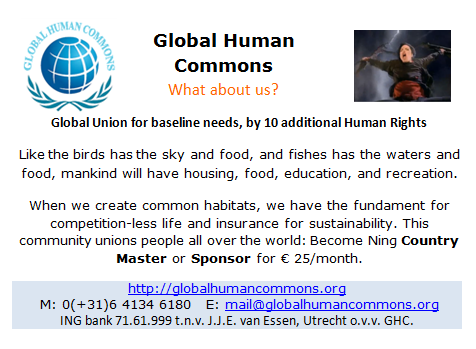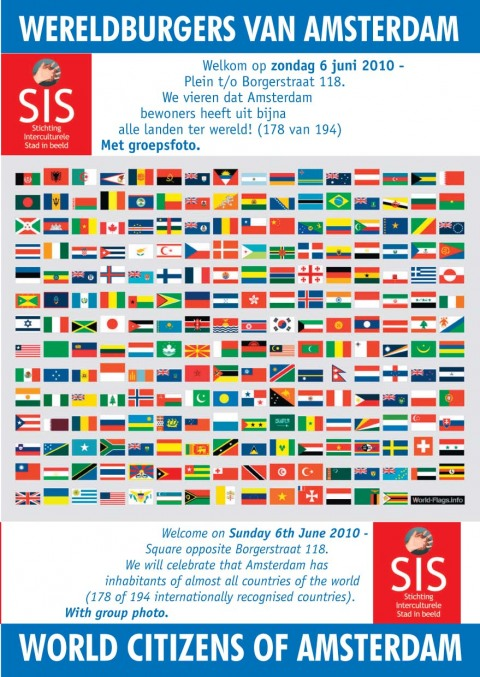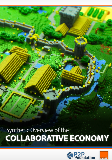

Global Human Commons
What about us?

Global Union for the baseline needs for Life and Wealth
Birds and fish can seek their nurture without restriction. Why then should some people be more restricted in meeting their basic needs than others?
We Have Powerful Tools to Build the Future We Want – and NEED!
The All-Win Principle and the Commons
We live in a world in which all people and nature are part of an integrated whole. Therefore, the more we empower one another and nature to flourish – without causing harm – the more we create an all-win universe.
Many hundreds of millions of people are already putting the all-win principle into action in their communities, professional groups and worldwide networks.
Wherever groups of people share and produce the resources they need in an open democratic manner so that all stakeholders benefit we can speak of a commons. When commons apply the all-win principle to their work, they multiply the power of one many times over. Used together, they are powerful tools to build the future we want.
Commons Have Three Aspects
- Commons Goods – resources a community collectively needs and uses;
- Commoners -- stakeholders who produce and/or steward these resources for the benefit of all involved;
- Commoning – an open and democratic form of making decisions about commons goods.
Commons provide a powerful foundation for an all-win world that can benefit all people and nature.
The commons idea is centuries old and there are countless examples where it has worked successfully.
- Indigenous Peoples have long used ways of living in harmony with nature, producing resources and making decisions that benefit all members of the community as well as future generations.
- Many millions of people today live in Ecovillages and Transition Towns and other communities that use a commons approach in the stewardship and sharing of resources and production of goods.
- Farmers and fisherman get together to ensure that the land and fish stocks their livelihoods depend upon remain bountiful. They decide on quotas, share information on new technologies, organize farmers’ markets and share transportation for their wares.
- The Internet itself is a global commons which supports a host of other commons-type activities such as OpenCourseWare and Wikipedia. Everyone contributes, everyone benefits and most of these resources are free.
- One billion people are registered members of collectively owned and/or managed commons-type businesses called cooperatives. These include credit unions, banks, supermarkets, health insurance companies and much more.
Where people see themselves as the custodians of the resources they need, they tend to nurture them for their own benefit as well as that of their children and children’s children. Where people feel their voices are heard and their needs are met by their communities, mutual appreciation, generosity and benevolence tend to flourish.
A commons approach reduces and weakens conflicts and creates resilience for both societies and nature.
The Array of Commons that Exist Worldwide Are a Step Toward a World Where All People and Nature Can Prosper
The kind of stewardship used by a commons cannot be performed by most corporations. They need to make a profit for their shareholders, often at the expense of many other people. Governments also are at a disadvantage when it comes to stewarding trans-border commons because these are in part outside of their influence.
Only the United Nations (all nations of the world acting together), coupled with the support of the people at large, can bridge the gap between business and governments. It is thus crucially important for the UN to adopt a commons-based approach to sustainable development.
We Invite You to Join with Us to Help Connect the Dots
We are a growing network of NGOs and individual people who are dedicated to a commons approach. So far we have focused mostly on the United Nations.
- We write to Heads of State and Government and the UN Secretariat and speak personally with the Ambassadors of the UN Member States, pointing to the many ways in which a commons approach can help eradicate poverty and build resilient local and global economies that are in harmony with Nature.
- We also apply a commons approach as we work with like-minded groups and people both within and outside of the UN to empower one another to do much more than we can do on our own.
Like-minded people from every walk of life are needed to create a tipping point. We need to move from a world that is governed by just a few to one where all people become responsible custodians of Mother Nature and have access to all the resources they need as well as being able to participate in managing and producing those resources.
For more information, please contact: Please place here, if possible, the name of the coordinator for the language in which this is written. Instead of: Lisinka Ulatowska, Co-founder of Commons Action for the United Nations and Coordinator of the United Nations Major Group Cluster for the Commons, at: Lisinka.Ulatowska@gmail.com
Also, please visit: www.globalcommonstrust.org and www.allwinnetwork.org
Links::
- All Win Network
- Antroposphere Inst.
- ARINA
- Be Commons
- Centre for Global Negotiations
- COMMONS CAMPUS
- Development4all
- E2Us
- Essence Admin
- Essence Sum
- Global Commons Trust
- Inst. for Planetary Synthesis
- Kosmos Journal
- Nature College
- One Childs Village
- On the Commons
-
P2P Foundation
- Recyclus
- Share the World’s Resources
- StarrPort
- SUM Foundation
- Summit Speak,
- Trees Have Rights Too
- URSULA
- VipCure
- Wiser Earth
- World Citizens Action
- Association of World Citizens
- Yours to? Mail us your URL!
Commmons-based communities linked worldwide and dedicated to the well-being of all people and nature can generate lives that are far less stressful than those most people have today.
Commons communities and networks already share their wisdom, funds, assets, time, and labor and by doing this they are developing economies at all levels based on caring, cooperation, sharing and community.
4 brief and enlightening papers on the Commons by Mary Beth Steisslinger:
- Commons and Climate Change;
- Multilateral Systems;
- Paradigm Comparison;
- Reclaiming the commons.
Commons Action for the United Nations and the UN -based Commons Cluster both advocate a commons-based economy at all levels at the United Nations.
The Commons Abundance Network (We CAN) is a structure that is being developed on the Internet to enable commons communities and networks to learn from one another, network, plan and act in unison. We Can will join with the Commons Cluster to do advocacy for a commons-based economy at all levels at the United Nations.
People and commons: global partnership missing links (also in pdf)
The environment, the economy and social relationships are interrelated aspects of sustainable development and what are increasingly being referred to as commons.
Commons are shared resources that naturally belong to collectives and provide
the natural and social capital upon which all life depends. Therefore, where people
have the jurisdiction to do so, they tend to be highly motivated to sustain their commons, and these commoners have developed countless initiatives to achieve this. A rights-based approach to sustainable development — based upon
environmental protection and restoration, economic prosperity and social justice to benefit all people and the planet as a whole — would recognize the value of various local, regional, national and global commons. This would motivate people and form the strongest possible foundation for a global partnership for development.
Governments need the support of the people to equitably and sustainably
manage various commons and undo their unsustainable patterns of production and consumption at local through global scales. Where Governments support people to
take greater responsibility for their vital resources, they will:
(a) motivate citizens and businesses to support commitments to sustainability;
(b) engage citizens and
businesses in being proactive about sustainability;
(c) educate citizens and
businesses about their consumption patterns and costs to the environment; and
(d) generate equitable funding that reinforces healthy patterns of production and
consumption through improved protection of various commons.
The incorporation of people and their commons in actions that benefit all
people and the planet as a whole is the strongest possible foundation for global
partnerships for sustainable development. It integrates sustainable local, regional,
national and international development because all parties and initiatives reinforce
one another.
Here are a few structural changes inspired by a commons approach:
(a) achieving the internalization of environmental costs;
(b) establishing rules and
guidelines for the use and management of common resources;
(c) creating incentives for sustainable development;
(d) setting rents or surcharges on the use of common
resources;
(e) developing economic instruments that increase as the sustainability of
the commons increase, with benefits accruing to people of the given commons.
Thousands of initiatives can be found on the many websites dedicated to local to
global commons (including www.onthecommons.org) and in the work of Nobel
Prize winner Elinor Oström.
Because they are dedicated to preserving the global commons for all people
and the world as a whole, global commoners can integrate global partnerships for
development.
We request Governments to create a panel of experts within the United Nations
Secretariat to explore with experts on the commons ways to incorporate a commons
approach into global strategies for sustainable development. The panel would report
back to the preparatory committee for the Rio+20 conference to inform the
preparations for that summit.
The Ten Commons Sustainability Human Rights - 2012
Living In Harmony With Nature - (Proposal)
Global Human Commons proposes the formulation of 10 new Human Rights that focus on humankind's relationship to Mother Nature and can ensure habitat, sources of living, a fair and resilient economy, and sustainability.
Nature is our source of life. However: in our daily battle to survive, humanity sees its relationships to nature in economic terms. Can we learn from the unsustainable practices of the past 1000 years and move from economic ownership through conquest to an economy based on owning and sharing?
This can be achieved by adopting the following principles::
- Nature is the basis for all forms of life.;
- Each human being must have, as a part of his or her birthright, a place to live and to harvest so as to have a valuable crib;
- Each human being has the right to take care of nature, neighbors, those with disabilities and the elderly;
- Each person has the right to work in a free economy provided safe and sustaiunable technology is used.
- If these four levels of interconnection are taken into account, humankind will be able to live in peace and harmony with nature by finding the right relationship with other members of society, food, a flourishing natural environment and spiritual and emotional balance.
This leads us to the formulationn of 10 humen rights.
In 1948 the United Nations adopted the Universal Declaration of Human Rights, consisting of 30 articles. With the following 10, the new Declaration would number 40.
31. Parts of our world's lands and waters are set aside to ensure that each person can partake of the benefits from our natural environment on which all forms of life depend to survive and thrive. Everyone has the right to share in these natural commons and the responsibility to ensure the sustainability of nature and biodiversity.
32. Everyone has the right to visit these natural commons.
33. Everyone has the right to sufficient fertile land and enough sunlight and water to produce wholesome food and a healthy living.
34. Everyone has the right to benefit from the commons--nature, culture, information, the Internet--and the duty to care for all those in need, including those with disabilities and the elderly.
35.Everyone has the right to sufficient free energy, good lighting, temperature control, waste disposal, telephone and Internet.
36. Everyone has the right to a healthy environment and unpolluted air. Everyone also has the responsibility to safeguard the cap that must be placed on pollution levels to ensure sustainability.37. Everyone has the right to accurate information and to participate in decision making at all levels on matters regarding his or her well-being--this on the basis of subsidiarity.
38. Everyone has the right to work on four levels – provided all use of technology is sustainable:
i. On his/her own land;
ii. In service of the community;
iii. In social services;
iv. Commercially.39. Everyone has the right to work and build on his/her land and to
exchange, but never sell or divest him or herself of it. After death, a person;s land will stay in the family for 5 years, after which time it is returned to the community to be given to a newly born child.
40. Humankind has the right to live in peace and harmony with nature and the responsibility to find a sustainable balance, taking into account population pressures, food, capacity of the natural environment and the necessary emotional and spiritual balance.
These rights were submitted on July 15th, 2010 to Secretary-General Ban Ki-moon's speech writer for mentioned in the Letter to the S-G, 64/196, U.N. GA 65 session, HQ, 14 September 2010, at 3 p.m., Agenda point 20(i).
The Bronning Rights supplement the Universal Declaration of Human Rights, adopted unanimously by the UN's General Assembly in 1948. This contains 30 rights. In short these focus on:
1. FREEDOM AND EQUALTY
2. RECOGNITION AND LAW
3. FREEDOM OF MOVEMENT AND NATIONALITY
4. MARRIAGE AND FAMILY
5. PROPERTY, THOUGHT, ASSOCIATION AND GOVERNMENT
6. SOCIAL SECURITY, EMPLOYMENT AND REMUNERATION
7. STANDARD OF LIVING AND EDUCATION
8. CULTURAL PARTICIPATION AND CREATIVE OWNERSHIP
9. SOCIAL AND COMMUNITY DUTIES
10. BRONNING RIGHTS (Additive 2012 ?)
In some more detail:
FREE AND EQUAL
1. All human beings are born free and equal;
2. Everyone is entitled to all the rights and freedoms set forth in this Declaration;
3. Everyone has the right to life, liberty and security of person;
4. No one shall be held in slavery or servitude;
5. No one shall be subjected to torture or to cruel;
RECOGNITION AND LAW
6. Everyone has the right to recognition everywhere as a person before the law;
7. All are equal before the law;
8. Everyone has the right to an effective remedy by the competent national tribunals;
9. No one shall be subjected to arbitrary arrest, detention or exile;
10. Everyone is entitled in full equality to a fair and public hearing by an independent and impartial tribunal;
11. 1. Everyone charged with a penal offence has the right to be presumed innocent until proved guilty.
12. No one shall be subjected to arbitrary interference with his privacy, family, home or correspondence;
FREEDOM OF MOVEMENT AND NATIONALITY
13. 1. Everyone has the right to freedom of movement and residence within the borders of each state.
2. Everyone has the right to leave any country, including his own, and to return to his country;
14. 1. Everyone has the right to seek and to enjoy in other countries asylum from persecution;
15. 1. Everyone has the right to a nationality.
2. No one shall be arbitrarily deprived of his nationality nor denied the right to change his nationality;
MARRIAGE AND FAMILY
16. 1. Men and women of full age, have the right to marry and to found a family.
The family is the natural and fundamental group unit of society;
PROPERTY, THOUGHT, ASSOCIATION AND GOVERNMENT
17. 1. Everyone has the right to own property alone as well as in association with others.
2. No one shall be arbitrarily deprived of his property;
18. Everyone has the right to freedom of thought, conscience and religion;
19. Everyone has the right to freedom of opinion and expression;
20. 1. Everyone has the right to freedom of peaceful assembly and association.
21. 1. Everyone has the right to take part in the government of his country, directly or through freely chosen representatives.
2. Everyone has the right of equal access to public service in his country.
3. The will of the people shall be the basis of the authority of government;
SOCIAL SECURITY, EMPLOIMENT AND REMUNERATION
22. Everyone, as a member of society, has the right to social security and is entitled to realization;
23. 1. Everyone has the right to work, to free choice of employment, to just and favourable conditions;
2. Everyone has the right to equal pay for equal work.
3. Everyone who works has the right to just and favourable remuneration ensuring for himself and his family an
existence worthy of human dignity, and supplemented, if necessary, by other means of social protection.
4. Everyone has the right to form and to join trade unions for the protection of his interests.
24. Everyone has the right to rest and leisure, including reasonable limitation of working hours and periodic holidays with pay.
STANDARD LIVING AND EDUCATION
25. 1. Everyone has the right to a standard of living adequate for the health and well-being of himself and of his family,
including food, clothing, housing and medical care and necessary social services;
2. Motherhood and childhood are entitled to special care and assistance.
All children, whether born in or out of wedlock, shall enjoy the same social protection.
26. 1. Everyone has the right to education.
3. Parents have a prior right to choose the kind of education that shall be given to their children.
CULTURAL PARTICIPATION AND CREATIVE OWNERSHIP
27. 1. Everyone has the right freely to participate in the cultural life of the community,
to enjoy the arts and to share in scientific advancement and its benefits.
2. Everyone has the right to the protection of the moral and material interests resulting from any scientific,
literary or artistic production of which he is the author.
SOCIAL AND COMMUNITY DUTIES
28. Everyone is entitled to a social and international order in which the rights and freedom can be fully realized.
29. 1. Everyone has duties to the community in which alone the free and full development of his personality is possible.
30. Nothing in this Declaration may be interpreted as implying for any State.
BRONNING RIGHTS (The proposal to add these was made in 2012)
31. A part of the global land and water will be common wealth to ensure
sustainability of
nature and species.
32. Everyone has the right to visit (parts of) common nature.
33. Everyone gets (for instance) 1000 m2 of fertile land on which enough sun
and water enters to produce good food and a healthy living.
34. Everyone gets the right and duty to get and give care to the commons and
peoples with inabilities and at age as a local service – part of lifetime activity.
35. Everyone gets free energy in an reasonable amount to has good light,
heating and cooling, cleaning, internet, and telephone.
36. Everyone gets a pollution quote and the right on healthy air and surrounding.
37. Everyone has the right on correct information and sufficient education.
38. Everyone has the right to work on four levels, provided only sustainable technology is used:
i. On his/her own land;
ii. In service of the community;
iii.In social services;
iv.In commerce.
39. Everyone has the right to work or build on his/her land, build a house on it and to
exchange with others. After dying the land may stay for five year in the
family. Then it will be free for giving it away to the community which will
give it to a new born child.
40. Mankind has the right to live in peace and harmony with nature by finding
together the right proportions for the above by becoming aware of
interrelationships as population, food, rich natural environment, and the
needed spiritual emotional balance.
For the full Universal Declaration of Human Rights see: www.un.org/en/documents/udhr
U.N. Human Rights org.: www.un.org/en/rights.
Michael Jackson - Heal The World - On YouTube
GLOBAL RESOURCE AGENCY (extra 13MB pdf)
In HARMONY with NATURE Request of the Sec. Gen. for letter writing
- UNPA Campaign
- 1We
- THE EARTH CHARTER
- WORLD CITIZENS OF AMSTERDAM - JUNE 6:



